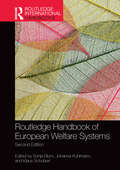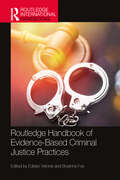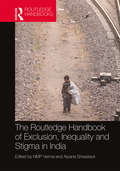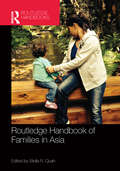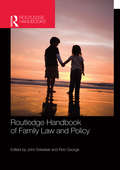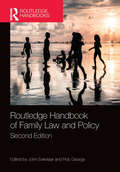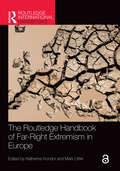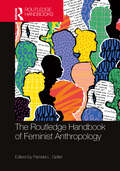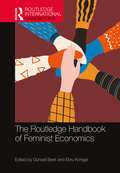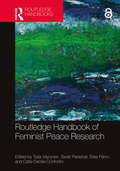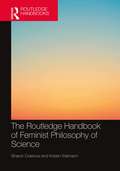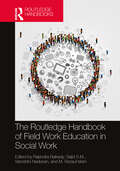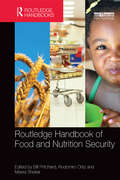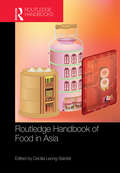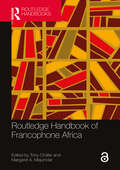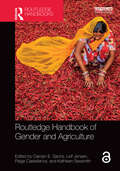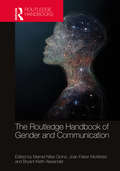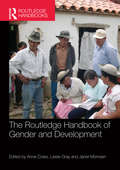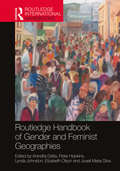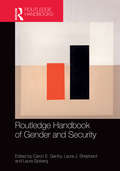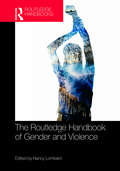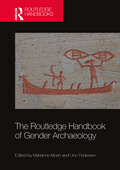- Table View
- List View
Routledge Handbook of European Welfare Systems (Routledge International Handbooks)
Published ten years after the first edition, this new Handbook offers topical, and comprehensive information on the welfare systems of all 28 EU member states and their recent reforms, giving the reader an invaluable introduction and basis for comparative welfare research. Additional chapters provide detailed information on EU social policy, as well as comparative analyses of European welfare systems and their reform pathways. For this second edition, all chapters have been updated and substantially revised, and Croatia additionally included. The second edition of this Handbook is most timely, given the often-fundamental welfare state transformations against the background of the financial and economic crises, transforming social policy ideas, as well as political shifts in a number of European countries. The book sets out to analyse these new developments when it comes to social policy. In the first part, all country chapters provide systematic and comparable information on the foundations of the different national welfare systems and their characteristics. In the second part, using a joint conceptual foundation, they focus on policy changes (especially of the last two decades) in different social policy areas, including old-age, labour market, family, healthcare, and social assistance policies. As the comparative chapters conclude, European welfare system landscapes have been in constant motion in the last two decades. While austerity is not to be seen on the aggregate level, the in-depth country studies show that all policy sectors have been characterised by different reform directions and ideas. The findings not only reveal both change and continuity, but also policy reversal as a distinct type that characterises social policy reform. The book provides a rich resource to the international welfare state research community, and is also useful for social policy teaching.
Routledge Handbook of Evidence-Based Criminal Justice Practices (Routledge International Handbooks)
by Edelyn Verona Bryanna FoxNow more than ever, the criminal justice system, and the programs, policies, and practices within it, are subject to increased public scrutiny, due to well-founded concerns over effectiveness, fairness, and potential unintended consequences. One of the best means to address these concerns is to draw upon evidence-based approaches demonstrated to be effective through empirical research, rather than through anecdote, standard practice, or professional experience alone (National Institute of Justice, 2011). The goal of this book is to describe the most useful, actionable, and evidence-based solutions to many of the most pressing questions in the criminal justice system today. Specifically, this edited volume contains brief and accessible summaries of the best available research, alongside detailed descriptions of evidence-based practices, across different areas of the criminal justice system. It is written so that practitioners and researchers alike can use the text as reference tool in their work and in training the new generation of individuals working to improve the system. Researchers and practitioners in many areas of criminal justice – crime prevention, policing, courts (prosecution, defendants, judges), corrections, sanctions, and sentencing – can reference specific chapters in this book to guide their policy and practice decisions. Although theory is a guide for the practices described, the chapters will address practical issues in implementation and action. This book overcomes the limitations of previous criminal justice practice books in that it is written as a practice resource and reference guide and spans practices and policies across different sectors of the criminal justice system – from prevention to policing to sanctions and corrections. Each chapter contains a list of action items, based upon the best available scientific research, that can be implemented in practice to address key issues and long standing challenges in the criminal justice system.
The Routledge Handbook of Exclusion, Inequality and Stigma in India
by N. M. P. Verma Alpana SrivastavaThis handbook critically examines the three concepts of exclusion, inequality and stigma and their interrelationship in the Indian context. Divided into five parts, the volume deals with the issues of exclusion, inequality, gender discrimination, health and disability, and assault and violence. It discusses important topical themes such as caste and social exclusion in rural labour markets, impact of poverty and unemployment, discrimination in education and literacy, income inequality and financial inclusion, social security of street vendors, women social entrepreneurs, rural–urban digital divide, workplace inequality, women trafficking, acid attacks, inter-caste marriages, honour killings, health care and sanitation, discrimination faced by those with disabilities, and regional disparities in India. The book traces rising socio-economic inequality and discrimination along with the severe lack of access to resources and opportunities, redressal instruments, legal provisions and implementation challenges, while also looking at deep-rooted causes responsible for their persistence in society. With emphasis on affirmative action, systemic mechanisms, and the role of state and citizens in bridging gaps, the volume presents several policies and strategies for development. It combines wide-ranging empirical case studies backed by relevant theoretical frameworks to map out a new agenda for research on socio-economic inequality in India with important implications for public policy. Comprehensive and first of its kind, this handbook will serve as a key reference to scholars, researchers and teachers of exclusion and discrimination studies, social justice, political economy, sociology, anthropology, economics, political science, development studies, education and public administration. It will also be useful to policymakers, bureaucrats, civil society activists, non-governmental organisations and social entrepreneurs in the development sector, in addition to those interested in third world studies, developing economies and the global south.
Routledge Handbook of Families in Asia
by Stella R. QuahResearch on the family has expanded considerably across Asia but studies tend to be fragmented, focusing on narrow issues within limited areas (cities, towns, small communities) and may not be accessible to international readers. These limitations make it difficult for researchers, students, policy makers, and practitioners to obtain the information they need. The Routledge Handbook of Families in Asia fills that gap by providing a current and comprehensive analysis of Asian families by a wide range of experts in a single publication. The thirty-two chapters of this comparative and multi-disciplinary volume are organized into nine major themes: conceptual approaches, methodological issues, family life in the context of culture, family relationships across the family life cycle, issues of work and income, stress and conflict, family diversity, family policy and laws, and environmental setting of homes. Each chapter examines family life across Asian countries, studying cultural similarities and differences and exploring how families are changing and what trends are likely to develop in the future. To provide a fruitful learning experience for the reader, each chapter offers examples, relevant data, and a comprehensive list of references. Offering a complete interdisciplinary overview of families in Asia, the Handbook will be of interest to students, academics, policy makers and practitioners across the disciplines of Asian Studies, Sociology, Demography, Social Work, Law, Social Policy, Anthropology, Geography, Public Health and Architecture.
Routledge Handbook of Family Law and Policy
by John Eekelaar Rob GeorgeChanges in family structures, demographics, social attitudes and economic policies over the last sixty years have had a large impact on family lives and correspondingly on family law. This book provides global perspectives on the policy challenges facing family law and policy round the world. The chapters apply legal, sociological, demographic and social work research to explore the most significant issues that have been commanding the attention of family law policy-makers in recent years. Featuring contributions from a range of renowned global experts, the book draws on multiple jurisdictions and offers comparative analysis across a range of countries. The book addresses a range of issues including: the role of the state in supporting families and protecting the vulnerable children’s rights and parental authority sexual orientation and gender in family law the status of marriage and other forms of adult relationships divorce and separation and their consequences the relationship between civil law and the law of minority groups assisted conception movement of family members between jurisdictions This advanced level reference work will be essential reading for students, researchers and scholars of family law and social policy as well as policy makers in the field.
Routledge Handbook of Family Law and Policy, 2nd edition
by John Eekelaar Rob GeorgeChanges in family structures, demographics, social attitudes and economic policies over the last sixty years have had a large impact on family lives and correspondingly on family law. The second edition of this Handbook draws upon recent developments to provide a comprehensive and up-to-date global perspective on the policy challenges facing family law and policy round the world.The chapters apply legal, sociological, demographic and social work research to explore the most significant issues that have been commanding the attention of family law policy-makers in recent years. Featuring contributions from a range of renowned global experts, the book draws on multiple jurisdictions and offers comparative analysis across a range of countries. The book addresses a range of issues including the role of the state in supporting families and protecting the vulnerable, children’s rights and parental authority, sexual orientation, same-sex unions and gender in family law, the status of marriage and other forms of adult relationships. It also focuses on divorce and separation and their consequences, the relationship between civil law and the law of minority groups, refugees, migrants and movement of family members between jurisdictions along with assisted conception, surrogacy and adoption. This advanced level reference work will be essential reading for students, researchers and scholars of family law and social policy as well as policy makers in the field.
The Routledge Handbook of Far-Right Extremism in Europe (Routledge International Handbooks)
by Katherine Kondor Mark LittlerThe Routledge Handbook of Far-Right Extremism in Europe is a timely and important study of the far and extreme right-wing phenomenon across a broad spectrum of European countries, and in relation to a selected list of core areas and topics such as anti-gender, identitarian politics, hooliganism, and protest mobilisation. The handbook deals with the rise and the developments of far-right movements, parties, and organisations across diverse countries in Europe. Crucially, it discusses the main topics and issues pertaining to far-right ideology and positioning, and considers how central and less central actors of far-right milieus have fared within the given context. Comprising a wide range of subject expertise, the contributors focus on far-right organisations on the margins of the electoral sphere, as well as street-level movements, and the relationship between them and electoral politics. The handbook spans nearly twenty European country cases, grouped according to geographical/regional area. It includes case studies where the far right has gained increased momentum, as well as countries where it has been much less successful in mobilising public opinion and the electorate (e.g. Ireland and Portugal). Another important feature is the inclusion of street-level mobilisations, such as football firms, thereby expanding and updating existing research, which is primarily focused on political parties and organisations. Multidisciplinary and comprehensive, this handbook will be of great interest to scholars and students of Criminology, Political Science, Extremism Studies, European Studies, Media and Communication, and Sociology.
The Routledge Handbook of Far-Right Extremism in Europe (Routledge International Handbooks)
by Mark Littler Katherine KondorThe Routledge Handbook of Far-Right Extremism in Europe is a timely and important study of the far and extreme right-wing phenomenon across a broad spectrum of European countries, and in relation to a selected list of core areas and topics such as anti-gender, identitarian politics, hooliganism, and protest mobilisation.The handbook deals with the rise and the developments of far-right movements, parties, and organisations across diverse countries in Europe. Crucially, it discusses the main topics and issues pertaining to far-right ideology and positioning, and considers how central and less central actors of far-right milieus have fared within the given context. Comprising a wide range of subject expertise, the contributors focus on far-right organisations on the margins of the electoral sphere, as well as street-level movements, and the relationship between them and electoral politics. The handbook spans nearly twenty European country cases, grouped according to geographical/regional area. It includes case studies where the far right has gained increased momentum, as well as countries where it has been much less successful in mobilising public opinion and the electorate (e.g. Ireland and Portugal). Another important feature is the inclusion of street-level mobilisations, such as football firms, thereby expanding and updating existing research, which is primarily focused on political parties and organisations.Multidisciplinary and comprehensive, this handbook will be of great interest to scholars and students of Criminology, Political Science, Extremism Studies, European Studies, Media and Communication, and Sociology.This project has received funding from the European Union’s Horizon 2020 research and innovation programme under the Marie Skłodowska-Curie grant agreement No 101029801.
The Routledge Handbook of Feminist Anthropology (Routledge Handbooks of Gender and Sexuality)
by Edited by Pamela L. GellerThe Routledge Handbook of Feminist Anthropology is a comprehensive inter- and intradisciplinary survey of the field of feminist anthropology. It has at its core a focus on raising consciousness and communicating information about gender inequities, suffering, and precarity, as well as furthering a praxis informed by intersectionality, decolonial intent, and compassion.Divided into three clear parts and comprising 34 chapters by an international team of contributors, the Handbook addresses topics in the following key areas: resisting violence communicating creatively labor migration and displacement health and disease reproduction intersectionality decolonial work. The collection assesses the field at an interesting moment in time—one defined by social justice and populist movements gone global; once and future pandemics; extreme environmental disasters; and neoliberalism interrupted. How do gender, sex, and sexuality intersect with these phenomena? In answer, contributors to this volume put a heterogeneous anthropological approach in place; they advance interdisciplinary conversations, as well as renew a commitment to intradisciplinary dialogue.The Routledge Handbook of Feminist Anthropology is essential reading for students, researchers, and instructors in anthropology, and will also be of interest to those in related disciplines such as gender studies, queer studies, economics, biomedicine, political science, sociology, geography, and science and technology studies.
The Routledge Handbook of Feminist Economics (Routledge International Handbooks)
by Günseli Berik; Ebru KongarThe Routledge Handbook of Feminist Economics presents a comprehensive overview of the contributions of feminist economics to the discipline of economics and beyond. Each chapter situates the topic within the history of the field, reflects upon current debates, and looks forward to identify cutting-edge research. Consistent with feminist economics’ goal of strong objectivity, this Handbook compiles contributions from different traditions in feminist economics (including but not limited to Marxian political economy, institutionalist economics, ecological economics and neoclassical economics) and from different disciplines (such as economics, philosophy and political science). The Handbook delineates the social provisioning methodology and highlights its insights for the development of feminist economics. The contributors are a diverse mix of established and rising scholars of feminist economics from around the globe who skilfully frame the current state and future direction of feminist economic scholarship. This carefully crafted volume will be an essential resource for researchers and instructors of feminist economics.
Routledge Handbook of Feminist Peace Research
by Tarja VäyrynenThis handbook provides a comprehensive overview of feminist approaches to questions of violence, justice, and peace. The volume argues that critical feminist thinking is necessary to analyse core peace and conflict issues and is fundamental to thinking about solutions to global problems and promoting peaceful conflict transformation. Contributions to the volume consider questions at the intersection of feminism, gender, peace, justice, and violence through interdisciplinary perspectives. The handbook engages with multiple feminisms, diverse policy concerns, and works with diverse theoretical and methodological contributions. The volume covers the gendered nature of five major themes: • Methodologies and genealogies (including theories, concepts, histories, methodologies) • Politics, power, and violence (including the ways in which violence is created, maintained, and reproduced, and the gendered dynamics of its instantiations) • Institutional and societal interventions to promote peace (including those by national, regional, and international organisations, and civil society or informal groups/bodies) • Bodies, sexualities, and health (including sexual health, biopolitics, sexual orientation) • Global inequalities (including climate change, aid, global political economy). This handbook will be of great interest to students of peace and conflict studies, security studies, feminist studies, gender studies, international relations, and politics.
The Routledge Handbook of Feminist Philosophy of Science (Routledge Handbooks in Philosophy)
by Sharon CrasnowThe Routledge Handbook of Feminist Philosophy of Science is a comprehensive resource for feminist thinking about and in the sciences. Its 33 chapters were written exclusively for this Handbook by a group of leading international philosophers as well as scholars in gender studies, women’s studies, psychology, economics, and political science.The chapters of the Handbook are organized into four main parts: I. Hidden Figures and Historical CritiqueII. Theoretical FrameworksIII. Key Concepts and IssuesIV. Feminist Philosophy of Science in Practice.The chapters in this extensive, fourth part examine the relevance of feminist philosophical thought for a range of scientific and professional disciplines, including biology and biomedical sciences; psychology, cognitive science, and neuroscience; the social sciences; physics; and public policy. The Handbook gives a snapshot of the current state of feminist philosophy of science, allowing students and other newcomers to get up to speed quickly in the subfield and providing a handy reference for many different kinds of researchers.
The Routledge Handbook of Field Work Education in Social Work
by Rajendra Baikady, Sajid S.M., Varoshini Nadesan, and M. Rezaul IslamThis Handbook provides an authoritative account of international fieldwork education in social work. It presents an overview of advances in research in social work field education through in-depth analyses and global case studies. Key features: * Discusses critical issues in teaching social work and curriculum development; health care social work; stimulated learning; field education policies; needs, challenges, and solutions in fieldwork education; reflexivity training; creativity and partnership; resilience enhancement; integrated and holistic education for social workers; student experience; practice education; and ethical responsibility of social work field instructors. * Covers social work field education across geographical regions (Asia and the Pacific; North and South America; Australia and Oceania; Europe) and major themes and trends from several countries (U.S.A.; Canada; Australia; China; Hong Kong; Sweden; Aotearoa New Zealand; England; Ukraine; Spain; Estonia; Italy; Ireland; Slovenia; Poland; Romania; Greece; Norway; Turkey; and the Czech Republic). * Brings together international comparative perspectives on fieldwork education in social work from leading experts and social work educators. This Handbook will be an essential resource for scholars and researchers of social work, development studies, social anthropology, sociology, and education. It will also be useful to educators and practitioners of social work in global institutions of higher studies as well as civil society organisations.
Routledge Handbook of Food and Nutrition Security (Routledge Environment and Sustainability Handbooks)
by Meera Shekar Bill Pritchard Rodomiro OrtizThe concept of food and nutrition security has evolved and risen to the top of the international policy agenda over the last decade. Yet it is a complex and multi-faceted issue, requiring a broad and inter-disciplinary perspective for full understanding. This Handbook represents the most comprehensive compilation of our current knowledge of food and nutrition security from a global perspective. It is organized to reflect the wide scope of the contents, its four sections corresponding to the accepted current definitional frameworks prevailing in the work of multilateral agencies and mainstream scholarship. The first section addresses the struggles and progression of ideas and debates about the subject in recent years. The other sections focus on three key themes: how food has been, is and should be made available, including by improvements in agricultural productivity; the ways in which politico-economic and social arenas have shaped access to food; and the effects of food and nutrition systems in addressing human health, known as food utilisation. Overall, the volume synthesizes a vast field of information drawn from agriculture, soil science, climatology, economics, sociology, human and physical geography, the nutrition and health sciences, environmental science and development studies.
Routledge Handbook of Food in Asia
by Cecilia Leong-SalobirThrowing new light on how colonisation and globalization have affected the food practices of different communities in Asia, the Routledge Handbook of Food in Asia explores the changes and variations in the region’s dishes, meals and ways of eating. By demonstrating the different methodologies and theoretical approaches employed by scholars, the contributions discuss everyday food practices in Asian cultures and provide a fascinating coverage of less common phenomenon, such as the practice of wood eating and the evolution of pufferfish eating in Japan. In doing so, the handbook not only covers a wide geographical area, including Japan, Indonesia, Vietnam, Singapore, India, China, South Korea and Malaysia, but also examines the Asian diasporic communities in Canada, the United States and Australia through five key themes: Food, Identity and Diasporic Communities Food Rites and Rituals Food and the Media Food and Health Food and State Matters. Interdisciplinary in nature, this handbook is a useful reference guide for students and scholars of anthropology, sociology and world history, in addition to food history, cultural studies and Asian studies in general.
Routledge Handbook of Francophone Africa
by Tony Chafer Margaret A. MajumdarThe Routledge Handbook of Francophone Africa brings together a multidisciplinary team of international experts to reflect on the history, politics, societies, and cultures of French-speaking parts of Africa. Consisting of approximately 35% of Africa’s territory, Francophone Africa is a shifting concept, with its roots in French and Belgian colonial rule. This handbook develops and problematizes the term, with thematic sections covering: Colonial and post-colonial ties between France and sub-Saharan Africa Belgium, Belgian colonialism and Africa The Maghreb African Francophones in France Francophone African literature and film ‘Francophone’ and ‘Anglophone’ Africa Beyond national boundaries and ‘colonial partners’ The chapters demonstrate the evolution of "Francophone Africa" into a multi-dimensional construct, with both a material and an imagined reality. Materially, it defines a regional territorial space that coexists with other conceptualisations of African space and borders. Conceptually, Francophone Africa constitutes a shared linguistic and cultural space within which collective memories are shared, not least through their connection to the French imperial imagination. Overall, the Handbook demonstrates that as global power structures and relations evolve, African agency is increasingly assertive in shaping French-African relations. Bringing this important debate together into a single volume, this Handbook will be an essential resource for students and scholars interested in Francophone Africa.
Routledge Handbook of Francophone Africa
by Tony Chafer Margaret A. MajumdarThe Routledge Handbook of Francophone Africa brings together a multidisciplinary team of international experts to reflect on the history, politics, societies, and cultures of French-speaking parts of Africa.Consisting of approximately 35% of Africa’s territory, Francophone Africa is a shifting concept, with its roots in French and Belgian colonial rule. This handbook develops and problematizes the term, with thematic sections covering: Colonial and post-colonial ties between France and sub-Saharan Africa Belgium, Belgian colonialism and Africa The Maghreb African Francophones in France Francophone African literature and film ‘Francophone’ and ‘Anglophone’ Africa Beyond national boundaries and ‘colonial partners’ The chapters demonstrate the evolution of "Francophone Africa" into a multi-dimensional construct, with both a material and an imagined reality. Materially, it defines a regional territorial space that coexists with other conceptualisations of African space and borders. Conceptually, Francophone Africa constitutes a shared linguistic and cultural space within which collective memories are shared, not least through their connection to the French imperial imagination. Overall, the Handbook demonstrates that as global power structures and relations evolve, African agency is increasingly assertive in shaping French-African relations.Bringing this important debate together into a single volume, this Handbook will be an essential resource for students and scholars interested in Francophone Africa.
Routledge Handbook of Gender and Agriculture
by Carolyn E. Sachs, Leif Jensen, Paige Castellanos, and Kathleen SexsmithThe Routledge Handbook of Gender and Agriculture covers major theoretical issues as well as critical empirical shifts in gender and agriculture. Gender relations in agriculture are shifting in most regions of the world with changes in the structure of agriculture, the organization of production, international restructuring of value chains, climate change, the global pandemic, and national and multinational policy changes. This book provides a cutting-edge assessment of the field of gender and agriculture, with contributions from both leading scholars and up-and-coming academics as well as policymakers and practitioners. The handbook is organized into four parts: part 1, institutions, markets, and policies; part 2, land, labor, and agrarian transformations; part 3, knowledge, methods, and access to information; and part 4, farming people and identities. The last chapter is an epilogue from many of the contributors focusing on gender, agriculture, and shifting food systems during the coronavirus pandemic. The chapters address both historical subjects as well as ground-breaking work on gender and agriculture, which will help to chart the future of the field. The handbook has an international focus with contributions examining issues at both the global and local levels with contributors from across the world. With contributions from leading academics, policymakers, and practitioners, and with a global outlook, the Routledge Handbook of Gender and Agriculture is an essential reference volume for scholars, students, and practitioners interested in gender and agriculture.
The Routledge Handbook of Gender and Communication (Routledge Handbooks of Gender and Sexuality)
by Marnel Niles Goins Joan Faber McAlister Bryant Keith AlexanderThis volume provides an extensive overview of current research on the complex relationships between gender and communication. Featuring a broad variety of chapters written by leading and upcoming scholars, this edited collection uses diverse theoretical frameworks to provide insight into recent concerns regarding changing gender roles, representations, and resources in communication studies. Established research and new perspectives address vital themes in this comprehensive text, including the shifting politics of gender, ethical and technological trends in gendered media, and gender in daily life. Comprising 39 chapters by a team of international contributors, the Handbook is divided into six thematic sections: • Gendered lives and identities • Visualizing gender • The politics of gender • Gendered contexts and strategies • Gendered violence and communication • Gender advocacy in action These sections examine central issues, debates, and problems, including the ethics and politics of gender as identity, impacts of media and technology, legal and legislative battlegrounds for gender inequality and LGBTQ+ human rights, changing institutional contexts, and recent research on gender violence and communication. The final section links academic research on gender and communication to activism and advocacy beyond the academy. The Routledge Handbook of Gender and Communication will be an invaluable reference work for students and researchers working at the intersections of gender studies and communication studies. Its international perspectives and the range of themes it covers make it an essential and pragmatic pedagogical resource.
The Routledge Handbook of Gender and Development (Routledge International Handbooks)
by Janet Momsen Anne Coles Leslie GrayThe Routledge Handbook of Gender and Development provides a comprehensive statement and reference point for gender and development policy making and practice in an international and multi-disciplinary context. Specifically, it provides critical reviews and appraisals of the current state of gender and development and considers future trends. It includes theoretical and practical approaches as well as empirical studies. The international reach and scope of the Handbook and the contributors’ experiences allow engagement with and reflection upon these bridging and linking themes, as well as the examining the politics and policy of how we think about and practice gender and development. Organized into eight inter-related sections, the Handbook contains over 50 contributions from leading scholars, looking at conceptual and theoretical approaches, environmental resources, poverty and families, women and health related services, migration and mobility, the effect of civil and international conflict, and international economies and development. This Handbook provides a wealth of interdisciplinary information and will appeal to students and practitioners in Geography, Development Studies, Gender Studies and related disciplines.
Routledge Handbook of Gender and Feminist Geographies (Routledge International Handbooks)
by Datta Anindita Hopkins Peter Johnston Lynda Olson Elizabeth Joseli Maria SilvaThis handbook provides a comprehensive analysis of contemporary gender and feminist geographies in an international and multi-disciplinary context. It features 48 new contributions from both experienced and emerging scholars, artists and activists who critically review and appraise current spatial politics. Each chapter advances the future development of feminist geography and gender studies, as well as empirical evidence of changing relationships between gender, power, place and space. Following an introduction by the Editors, the handbook presents original work organized into four parts which engage with relevant issues including violence, resistance, agency and desire: Establishing feminist geographies Placing feminist geographies Engaging feminist geographies Doing feminist geographies The Routledge Handbook of Gender and Feminist Geographies will be an essential reference work for scholars interested in feminist geography, gender studies and geographical thought.
Routledge Handbook of Gender and Security
by Laura Sjoberg Laura J. Shepherd Caron E. GentryThis handbook provides a comprehensive look at the study of gender and security in global politics. The volume is based on the core argument that gender is conceptually necessary to thinking about central questions of security; analytically important for thinking about cause and effect in security; and politically important for considering possibilities of making the world better in the future. Contributions to the volume look at various aspects of studying gender and security through diverse lenses that engage diverse feminisms, with diverse policy concerns, and working with diverse theoretical contributions from scholars of security more broadly. It is grouped into four thematic sections: Gendered approaches to security (including theoretical, conceptual, and methodological approaches); Gendered insecurities in global politics (including the ways insecurity in global politics is distributed and read on the basis of gender); Gendered practices of security (including how policy practice and theory work together, or do not); Gendered security institutions (across a wide variety of spaces and places in global politics). This handbook will be of great interest to students of gender studies, security studies and IR in general.
The Routledge Handbook of Gender and Violence
by Nancy LombardThe Routledge Handbook of Gender and Violence provides both a comprehensive and authoritative state-of-the-art overview of the latest research in the field of gender and violence. Each of the 23 specially commissioned chapters develops and summarises their key issue or debate including rape, stalking, online harassment, domestic abuse, FGM, trafficking and prostitution in relation to gender and violence. They study violence against women, but also look at male victims and perpetrators as well as gay, lesbian and transgender violence. The interdisciplinary nature of the subject area is highlighted, with authors spanning criminology, social policy, sociology, geography, health, media and law, alongside activists and members of statutory and third sector organisations. The diversity of perspectives all highlight that gendered violence is both an age-old and continuing social problem. By drawing together leading scholars this handbook provides an up-to-the-minute snapshot of current scholarship as well as signposting several fruitful avenues for future research. This book is both an invaluable resource for scholars and an indispensable teaching tool for use in the classroom and will be of interest to students, academics, social workers and other professionals working to end gender-based violence.
Routledge Handbook of Gender and Water Governance (Routledge Environment and Sustainability Handbooks)
by Tatiana Acevedo-Guerrero Lisa Bossenbroek Irene Leonardelli Margreet Zwarteveen Seema KulkarniThis handbook provides a comprehensive overview of the field of gender and water governance, exploring how the use, management and knowledge of water resources, services and the water environment are deeply gendered.In water there is a recognized gender gap between water responsibilities and water rights and bridging this gap is likely to help achieve not just goals of equity but also those of sustainability. Building on a rich legacy of feminist water scholarship, the Routledge Handbook of Gender and Water Governance is a collection of reflections and studies that can be used as a prismatic lens into a thriving and ever proliferating array of feminist water studies. It provides a clear testimony of how hydrofeminism has evolved from rather instrumental gender and water studies to scholarship that uses feminist tools to pry open, critically reflect on and formulate alternatives to water development-as-usual. The book also shows how the community of feminists interested in studying water has diversified and expanded, from often white female scholars studying projects and gender relations in the so-called Global South, to a varied mix of scholars and activists theorizing from diverse geographical and political locations – prominently including the body. It is organized into five interconnected parts: Part I: Positionality and embodied waters Part II: Revisiting water debates: diplomacy, security, justice and heritage Part III: Sanitation stories Part IV: Precarious livelihoods Part V: New feminist futures Each of these parts brings out the gendered nature of water, shedding light on the often neglected care and unpaid labour of women and its relationship with extractivism and socioeconomic inequalities. The overall aim of the handbook is to apply social science insights to water governance challenges, creating synergies and linkages between different disciplines and scientific domains.The Routledge Handbook of Gender and Water Governance is essential reading for students, scholars and professionals interested in water governance, water security, health and sanitation, gender studies and sustainable development more broadly.
The Routledge Handbook of Gender Archaeology
by Marianne Moen Unn PedersenThis volume presents a comprehensive overview of gender archaeology, both theory and practice, and contributes a substantial and definitive reference work by bringing together state-of-the-art research, theoretical overviews, and the latest debates in the field.Responding to the shifts in the theoretical landscape and the societal and political frameworks within which we produce our knowledge, chapters create both a solid theoretical baseline which help readers grasp the significance of gender in archaeology as well as offer perspectives on how to engender produced knowledge about the past. In line with recent focus on the shortcomings of gender and archaeological representation, chapters also detangle academic discourse and popular representations in order to present novel ways of successfully negotiating the pitfalls of gendered ideas about past behaviours. By encouraging novel ways of integrating theoretical perspectives with scrutiny of gender stereotypes, original empirical examinations of identity markers and behaviours, and re-examinations of static representations of identities through new lenses, such as intersectional perspectives, personhood, and materiality debates, the volume is theoretically rich and will simultaneously provide a necessary benchmark for future archaeological discourses. Finally, it will incorporate perspectives from researchers with diverse backgrounds and viewpoints to provide a truly comprehensive overview. It will not shy away from engaging with politically contentious issues surrounding knowledge production but will include perspectives from researchers whose focus is less on feminist critiques and more on gender and identities. Thus, the volume bridges the two most prominent directions currently discernible within the focus area, namely, feminist re-examinations on the one hand and research focused more on bodily practice and gendered experiences on the other.The Routledge Handbook of Gender Archaeology is an invaluable resource for students and researchers in gender archaeology as well as gender studies more widely.
